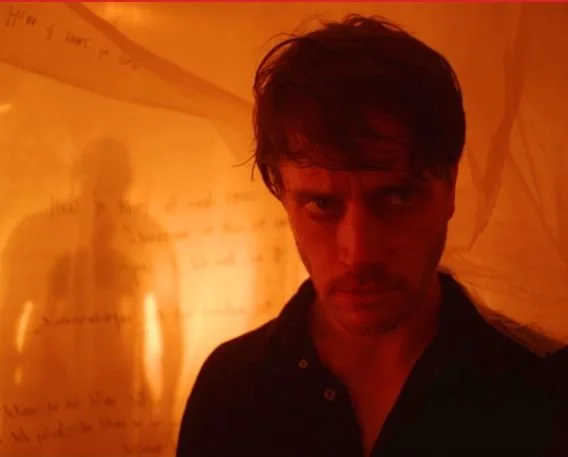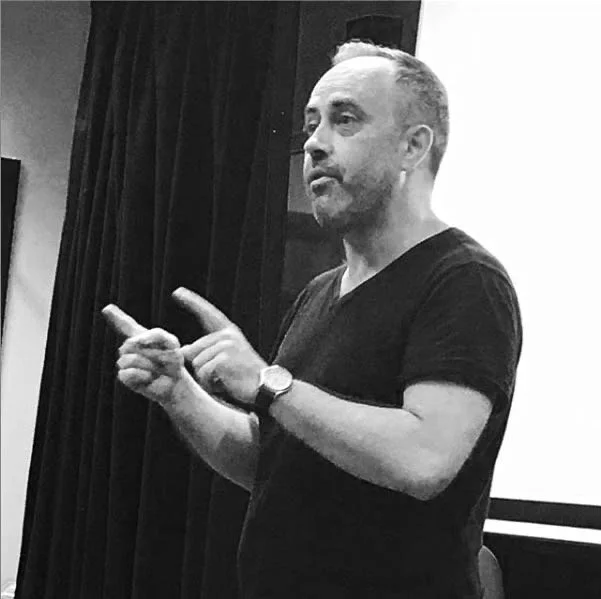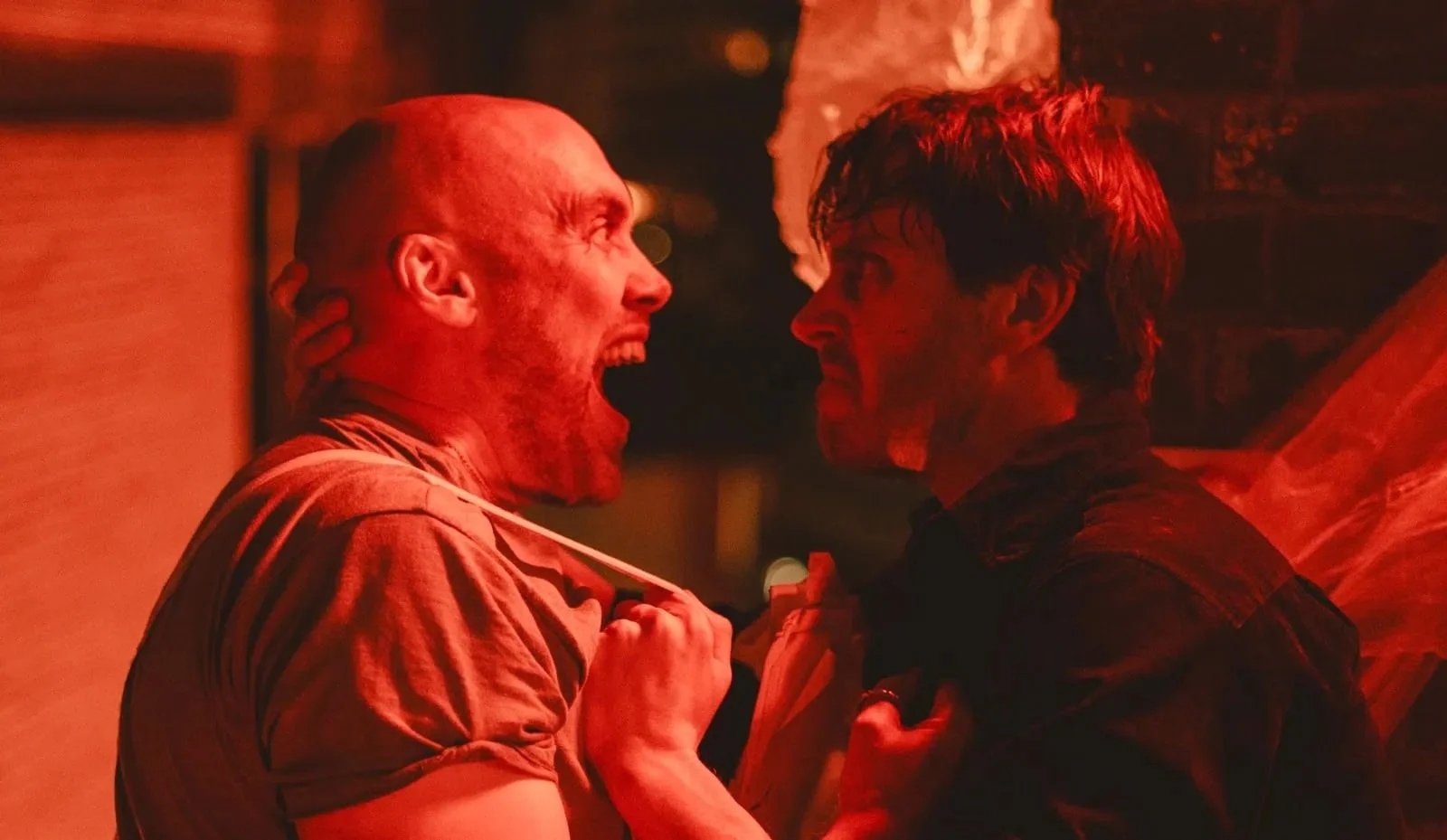IN CONVERSATION WITH MATT HARLOCK
Perhaps best known so far for his documentary work, including AMERICAN: THE BILL HICKS STORY, Matt Harlock makes his feature directing debut with BLOCKHEAD, which receives its world premiere at FrightFest. Telling the tale of Will (Danny Horn) , an author struggling with writer's block. After befriending loutish handyman Mikey (Joe Simms), Will’s creativity flows once more while his life spirals into chaos and bloodshed. GORE IN THE STORE spoke to Matt about the move from documentary filmmaking to narrative features and his own creative impulses.
GORE IN THE STORE - Did you take any over any skills from your documentary filmmaking to this, your first feature film?
MATT HARLOCK - So I did a couple of documentaries. One was AMERICAN: THE BILL HICKS STORY, which was back in 2010 and I also made another documentary for Vice around the middle of the last decade. But the thing about documentary, I think, is that you're attempting to unravel something which has happened, and you're looking to try and find facts and kind of piece those together. Whereas with narrative fiction, it's kind of the other way around. You're kind of inventing things which fit into an idea that you've had. So they are quite different disciplines in that way. But I think that maybe the main thing that I was really interested in, was the idea of the creative process and truth. And so there is a truth to Will's past and his backstory, which is obscuring and he's doing that himself in his head. And obviously the idea of unearthing truth, I think, is common to both of those disciplines. So if you're someone who is struggling to write, and you don't know why, then obviously there might be something as in this story, which is the reason for that is in your past, and it's to do with acknowledging the reality of things. And I think that that's the problem that Will has, is that he's denying where he's been and where he's come from.
The film feels quite personal when dealing with Will's insecurities. Does that come from a personal place yourself in dealing with creative matters?
MH - I was interviewing a guy called Tony Grisoni, who's quite a well known screenwriter. He did FEAR AND LOATHING IN LAS VEGAS and the RED RIDING trilogy. I remember him saying he was talking about writers having to expose themselves and to be okay with digging into their own soul and stuff. And I said, “But what happens if you're not that kind of writer, if you can't go there?” He said, “Well, if you can't go there, what the fuck is the point of your story?” And it changed my view of what I was supposed to be doing, writing wise. So there are elements. It's not an autobiographical story. I've never killed anyone for a premise, but I do feel that there are elements of me in there which I wanted to put in, and some of them I didn't want to put in, and they came out kind of naturally in the process of writing. So I think it’s something very natural for creatives. You're a writer, I'm sure you've maybe experienced that sometimes you feel that you're not good enough for the thing that you want to do. I think a lot of writers and creatives feel that way. So I was very interested in that notion of the creative, reaching for a high goal and feeling that they're not, not up to it. That was partially born out of my interest in Salieri, I'm a big fan of AMADEUS, and the idea of Salieri’s curse. This poor guy who's not terrible, he's not bad. He's just in the middle, and he unfortunately happens to be sitting next to one of the greatest composers of all time, so he keeps negatively comparing himself. So that was kind of the idea, what I was looking to explore within myself. It's less about biographical details. It's more about if you as a writer are going to spend two and a half years on something, you have to connect with the emotional dilemma of that character. Not necessarily have been through it, but you have to connect with it. And so that that element definitely was autobiographical.
Did this spring from a case of writer's block at all? Or did this come from somewhere else?
MH - It actually sprang from a very specific thing that happened to me, which was that I had been working on a short film in 2018 and it got picked up by some quite large American partners. I was working with them through most of lockdown. I won't say who, because it didn't really come to the right ending, and it kind of all fell apart. I felt very disillusioned by that experience. So it wasn't a case of writer's block. It was more a case of working on a pipeline which was going to lead towards production, and these partners are big names, like you would know them. So when that didn't happen, I felt quite disappointed, after spending a year and a half on it, thinking we were going to go to a certain place, so I came away from that thinking the next thing that I'm going to do is going to be completely controlled by me. I'm not going to go and seek any bigger partners who get to decide whether or not we make the film, I’m making this one. And so maybe the block that led to BLOCKHEAD was actually not a writer's block. It was a production block, if that makes sense. Essentially, I said, “Right, okay, we're pulling together the community that I work with.” I know quite a lot of filmmakers through a thing I run called No Direction Home, which is a kind of a directors and producers and filmmakers community. And that's what happened, is that we basically reached out to the people that we know, and we managed to do it ourselves.
DR JEKYLL AND MR. HYDE is mentioned in the film. Was this a particular influence on you?
I didn't want to make too much of it, because I didn't want to give a concrete idea of what Mikey was in relation to Will. But the thing that I was really interested in with Jekyll and Hyde was that Jungian idea of the shadow self, like the dark half. I've always been interested in that. And so with films like FIGHT CLUB or THE MACHINIST, where you have some other kind of iteration of the character which suggests the darker impulses, I was always interested in that idea. But the other reason that I was interested in Jekyll and Hyde specifically was because there’s quite an interesting creation myth or story around its writing, which is to do with Robert Louis Stevenson, having a panic attack or nervous breakdown after having been given cocaine for the first time, unknowingly by his wife, and the idea that he wrote a 30,000 word novella in three days. Then he said it's not good enough. Ripped it up and wrote it again. And he did this all from his sick bed, having retired to bed because he couldn't write. And this was all in a very interesting book that I read called WRITING ON DRUGS by a woman called Sadie Plant. And in there she detailed various other kinds of inspirational moments for other novels, or the writers themselves. So I was quite interested in the idea of that inspiration moment and where that came from in the case of Jekyll and Hyde.
You just mentioned FIGHT CLUB and THE MACHINIST, and that leads into another question I had about Mikey’s introduction. Some viewers may think they've seen this trope before, but you go somewhere far more interesting with it. Was this particular trope something you wanted to explore as well?
MH - I want to be very careful about how I say things around him, because I don't want to give a definitive reading of it. But I guess the point was that I don't give away any kind of spoilers to the end of the film at all. But the point is that as far as I can see, there are other people who are aware of Mikey. So that might mean that he is part of a psychotic kind of imagination of Will’s, but it might also mean that he is some entity which exists separately, and I don't really want to be definitive about that. But I think the thing that I was interested in exploring was what happens with the desperation that you're trying to achieve something, and that desperation is very strong. What can the manifestation of that be, or be like? And so it might be that some people read it as something that only is going on in Will's mind, but I think there are other clues in the film which maybe give it some different kind of readings as well. What did you think?
SLIGHT SPOILER WARNING!
I will admit having to go back to watch the ending again, I like how you're just left wondering, and remembering clues to decipher throughout the film, like you say. The editing of the climax of the film seems to suggest or ask is this wish fulfillment? Is this fantasy? Is this, past, future and present all colliding at once or is it something else?
MH - I'm actually far more interested in what you think than what I could tell you. I think the thing that you touched on, the thing that we are aiming for, is that we were attempting to try and give an ending which gave multiple interpretations, rather than definitively landing on one. Maybe it's not a perfect example, but the example that I used a couple of times was the end of INCEPTION with the spinning top wobbling and everyone wondering if we're left in that limbo. I think the thing for me was, and you've touched on it, with the idea of Mikey and his relationship to this spectre, this figure that could be in his imagination, or it could be something else, is that I didn't want to give away a definitive answer to that. I didn't want to give it away because I was much more interested in people's interpretation of it. And I think the thing that most satisfied me about the ending was working with an amazing editor called Chris Blaine, who's a director as well. He directed NINA FOREVER. I've known Chris as a friend for many years, so I was really pleased to be working with him. And we were pushing each other to come up with different ways of doing that. And Chris nailed it in the end, he's fantastic to work with. I think the thing that we were both attempting to try and get was we were hoping to try and find something a little bit more like, “Let's go and talk about that in the pub afterwards.” Those are the kind of films that I like.
Another thing I was just wondering about there was ego and inspiration as malignant forces, and possibly a physical kind of virus. I was wondering where that idea came from.
MH - I remember a producer talking to me about this and saying “Oh, it's so sad. These filmmakers, they're all kind of possessed by this zombie-like virus, drawn towards this idea of getting a film made, and all these kinds of notions,” which seemed to be quite a negative view of it. I think the point about the creative force is that it's a really strong force, so it can be positive or negative. It's not all just like, “Oh, how nice it is to be creative!” It doesn't always feel that way. Sometimes it feels like a burden that you're carrying on your shoulders. So the idea of that being instilled within you is something that I ask myself about a lot. I wonder where that came from. I know other friends of mine who are very intelligent who just don't have it. The idea of that being in you and not being something that you necessarily wanted or asked for, but it’s just there... It just felt quite parasitic. It just felt like there was a kind of viral nature to it. I quite like the idea of creativity being represented as a force which is strong and it's neither positive or negative. It can be both of those things. That, to me, felt like quite a nice fun idea to explore.
END OF SPOILERS
Iain MacLeod




